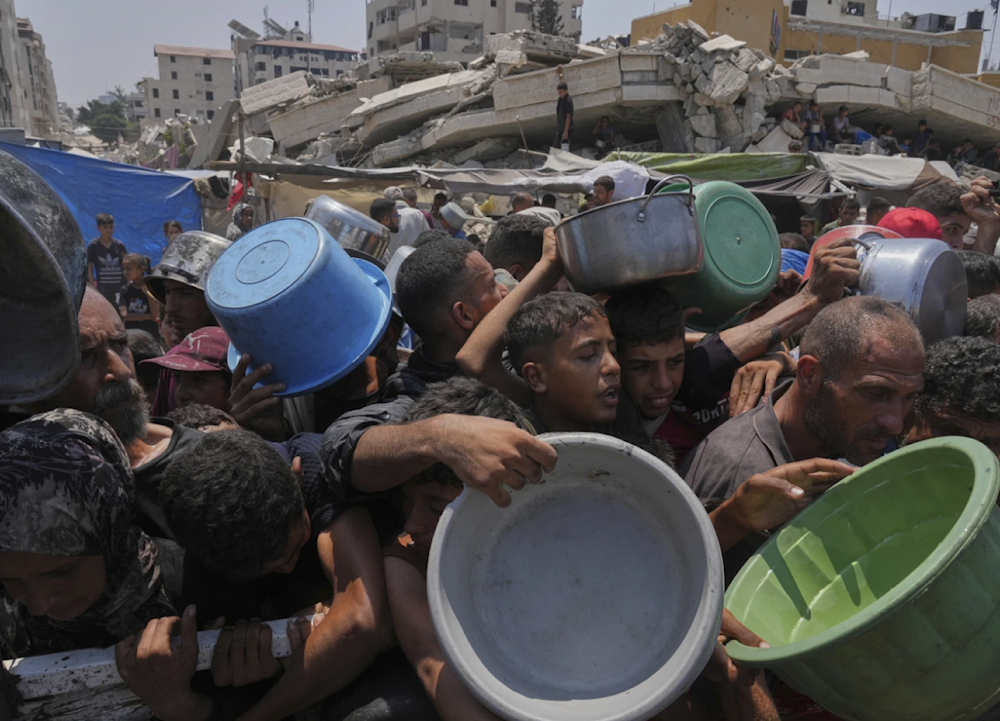Israeli measures do nothing to end starvation in Gaza: Aid workers
Humanitarian groups blame "Israel’s" ongoing blockade as the primary driver of the starvation crisis, which has claimed the lives of 154 Palestinians.
-

Palestinians struggle to get donated food at a community kitchen in Gaza City in northern Gaza on July 26, 2025 (AP)
Aid organizations have criticized "Israel’s" recently announced humanitarian measures in Gaza, such as daily pauses in fighting, airdropped supplies, and limited aid corridors, saying they are inadequate and fail to address the worsening famine. These steps, introduced on Sunday under growing international pressure, have not eased the severe restrictions on aid access, aid workers told The Guardian.
Humanitarian groups blame "Israel’s" ongoing blockade as the primary driver of the starvation crisis, which has claimed the lives of 154 Palestinians, including 89 children, over half of them in the past month alone. Despite the deepening emergency, Israeli airstrikes continue, with at least 104 people killed in 24 hours, according to Gaza’s health ministry.
Oxfam policy lead Bushra Khalidi called the new measures “token gestures", accusing "Israel" of using them to deflect international criticism while continuing to obstruct aid deliveries.
Most border crossings remain closed, and the UN has reiterated its call for a full ceasefire and the unrestricted entry of humanitarian aid to prevent further loss of life.
Aid trucks still below UN reccomendation
Since the announcement of the new measures, the number of aid trucks has increased slightly, with over 200 trucks reported Tuesday, according to "Israel’s" Coordination of Government Activities in the Territories (COGAT). This brings the daily average to around 70 trucks since May.
The figure remains below the 500-600 trucks per day that the UN says are needed to meet the basic needs of Gaza’s 2 million residents. Aid organizations warn that the real requirement may now exceed even that, as famine tightens its grip on the population.
“The needs are exponentially greater than they were prewar. But the access is actually worse," said Khalidi. “You can’t end starvation with 10 or even 300 trucks. What we need is not token aid, but real, systemic change.”
Despite the alleged increase in aid deliveries, residents and health workers on the ground say they’ve seen no improvement. Malnutrition continues to spread, and essential supplies remain out of reach for many.
"We are hearing a lot of news that more aid will come, but this is just in the media. The situation on the ground has not changed since Sunday. The food supply has not reached the target population,” said Dr. Nouraldin Alamassi of Project Hope’s medical team in Gaza. "The food supply has not reached the target population."
Bureaucratic barriers block critical aid deliveries
Alamassi reported that malnourished children continue to arrive at his clinic daily in search of food, with patient numbers now double the facility’s capacity. He noted that vital nutritional supplies, such as high-energy biscuits used to treat malnutrition, have completely run out.
Aid workers with international organizations say that new bureaucratic barriers are further hampering their ability to deliver aid. One major obstacle is a newly introduced registration process for international NGOs (INGOs), which requires non-UN groups to register with "Israel’s" newly formed Ministry for Diaspora Affairs and Combating Antisemitism.
As part of this process, INGOs are being asked to submit personal identification details of their Palestinian staff, something most organizations refuse to do, citing serious safety concerns for their employees in both Gaza and the West Bank. With numerous aid workers already killed in Gaza, organizations fear that sharing staff data could increase the risk to their lives.
Many humanitarians fear that, without official registration, customs officials will not permit them to import critical supplies into the besieged territory, threatening their ability to deliver urgently needed aid.
Aid workers have struggled to get clear answers from Israeli customs about why many shipments are blocked or delayed, viewing the lack of transparency as a deliberate tactic to complicate aid deliveries. For example, shipments of dates and olives were repeatedly discarded without explanation. After sharing experiences, aid groups found that items containing pits or seeds, potentially for planting, were systematically rejected. Later shipments with date paste and pitted olives were allowed, indicating selective approval based on contents.
“It’s always give with one hand, take away with the other,” said Sam Rose, acting director of UNRWA affairs in Gaza.

 4 Min Read
4 Min Read










